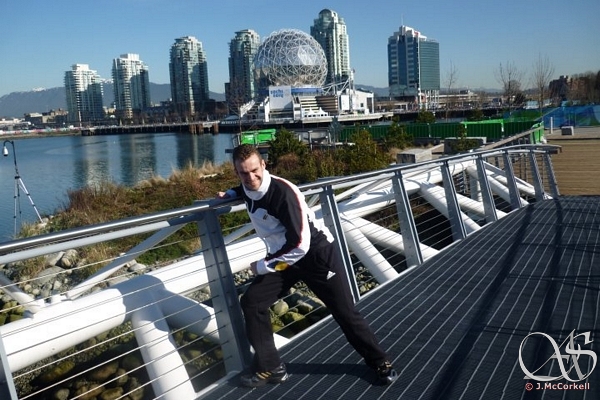Kevin Van Der Perren's Olympic Experiences
February 25, 2018
By Mireille Geurts
Photos © Ageha, EMJO, Joy, Mireille Geurts, Jenna McCorkell, Sean McKinnon, KevinVDPerren.com
"I remember everything from those Games. What I did on my day off, how my room looked, how the Olympic Village was, how the ice rink looked, how it looked outside. Everything!"
I have Kevin Van Der Perren on the telephone, talking to me about his Olympic experiences. As a veteran of three Olympics (Salt Lake City in 2002, Turin in 2006, and Vancouver in 2010), he has a lot to talk about. Which Olympic Games was he just referring to? That would be Salt Lake City, now already 16 years in the past.
"Salt Lake City has the best memories for me. It was my first Olympics, and I think most athletes recall their first the best as it's the first time you get a taste of that whole atmosphere and you have to figure out how everything works. Also I liked the location best, personally. Career-wise, everything basically started there for me. When I got back home I got financial support from the government, my expenses got paid. My whole life changed there! The goal was to qualify, make the top 24, and then I came in 12th. So I was very ... pleased. [chuckles]"
Pleased he definitely was, most of us watching those Olympics recall his happy reaction at the end of his programs. (Youtube link to SP)
What did you do on your days off then?
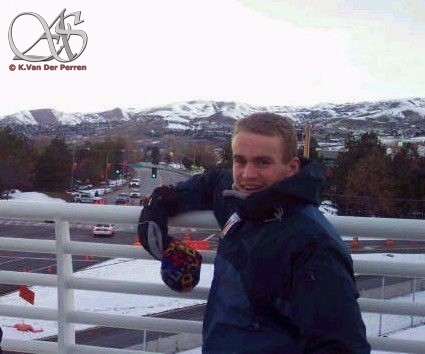 "We went to the city centre, sightseeing. We went to the speed skating, which took place right across from the Olympic Village. I was in the area a while before the Games already, training some place outside the Olympic surroundings. But I didn't stay that long after. Three days after my competition ended, I went home, because I had to go to the Junior Worlds, Worlds and even the Flemish Championships (which is not nationals -ed). I actually have never stayed until the closing ceremony in all three Olympics. Always had to go home to practice. Actually, after Turin in 2006, I came home as quickly as possible to start training for Worlds because I was angry."
"We went to the city centre, sightseeing. We went to the speed skating, which took place right across from the Olympic Village. I was in the area a while before the Games already, training some place outside the Olympic surroundings. But I didn't stay that long after. Three days after my competition ended, I went home, because I had to go to the Junior Worlds, Worlds and even the Flemish Championships (which is not nationals -ed). I actually have never stayed until the closing ceremony in all three Olympics. Always had to go home to practice. Actually, after Turin in 2006, I came home as quickly as possible to start training for Worlds because I was angry."
Angry? You came in 9th place, which was a good result?
"Yeah, my goal was top 10, so it was actually okay, but in the short program I had intended to go for the quad, but we changed our minds at the last minute because a lot of the others hadn't skated so well. The idea was to play it safe and then I fell on my triple Flip, just down, bam! So I was only 12th after the short program. I did end up in 7th in the free, but in general I was a bit pissed off and wanted to redeem myself at Worlds. And in the end I wasn't even able to compete there, because I got a hip injury. I missed the 2006 and 2007 World Championships because of that injury."
T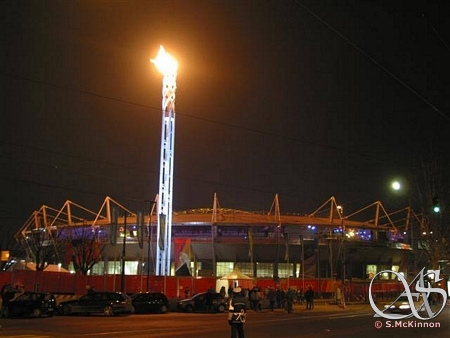 hat is a shame, but at least the whole Olympic atmosphere must make up for that?
hat is a shame, but at least the whole Olympic atmosphere must make up for that?
"Actually, Turin didn't really feel as much like the Olympic Games for me. We already had a European Championships there the year before, I had participated in the Grand Prix Final there, so I knew exactly where everything was and how it worked. Everything was in that already familiar ice rink. Okay, there were people there who I knew, which was really nice, family - my parents and my sister - but it just didn't feel like the Olympics, it just felt like a European or World Championships."
Of course they are only once in four years and are considered very prestigious, but aside from that, what makes the Olympic Games so different, so special?
"The Olympics are so special because of the hype around it. In figure skating, it's actually almost the same competition as a World Championship, almost the same competitors field. But everything around it, the media interest, the way it's hyped, it's a frenzy."
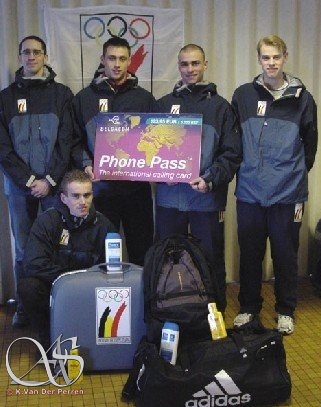 And if you don't look at the event itself, are there other differences?
And if you don't look at the event itself, are there other differences?
"It makes your season tougher, as you have to peak an extra time. It changes how you prepare yourself. I tried to move my peak from Euros to a month later. I was usually in good shape in November, and it's pretty hard to keep that up for so long. On second thought, what does make the Olympics very different from other competitions is the nearness of athletes from other sports. The Belgian delegation didn't used to be as big as it is this year. In my time it was 4 and 6 people. [laughs] It seems much more pleasant to be with a bigger team. Don't get me wrong, our team got along very well, we laughed a lot and we went to support each others' competitions, but still, it's only 6 people. I think if you're with a bigger team, it gives a whole different atmosphere. And I think that would make the biggest difference from the feeling you have at a World Championships."
Two out of the three times, you've been the chosen delegation member to bring in the flag, right?
"I carried the flag in Turin and Vancouver. It is really an honor to be chosen for that. But when you're there, you are so focused on why you are there, it all passes by you in a flash. Looking back, I am extremely happy I was able to do that."
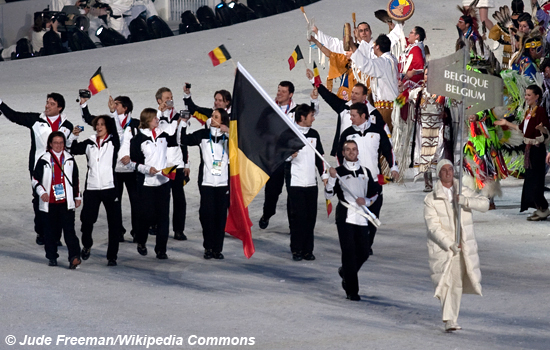
And how does that work, with all those athletes in that one ceremony?
"You have to be present 2-3 hours ahead of the opening ceremony, in the halls below the tribunes. The Games I was at, there were no screens or anything, so you only saw what happened from the moment you stepped out and walked into the arena. As soon as you step in there the atmosphere truly hits you, it's overwhelming. I remember from Vancouver that there was still quite a lot of the actual show happening, after we entered, which was really nice. It is a long and tiresome evening, but truly unforgettable."
Now that you've mentioned Vancouver, those were not your favorite Games, right?
"No, but I couldn't prepare at all then. I had received a large budget so that was extremely nice, no worries there, but I ruptured my Achilles tendon at the beginning of the previous summer, so I could only start training in October, so yeah... [sighs]. When people ask me about the Olympics, I will always mention Vancouver last, or not at all, preferably. It still stings. Okay, I did go to those Games, but I had already left home with the feeling of ‘what the hell am I going to do, I am totally not prepared?' If only the Olympics had been a month later. I just didn't have enough time to be able to perform. Worlds after Vancouver was good, so yeah. (8th place - ed)"
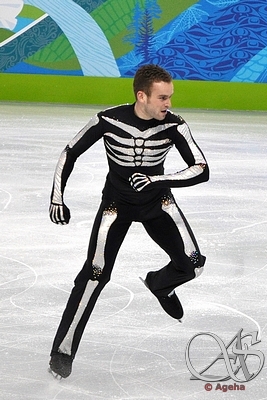
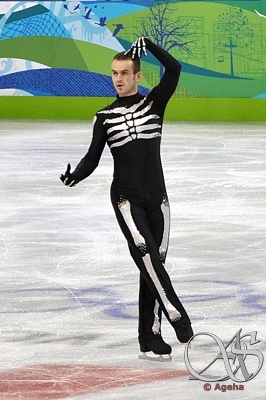
And to stay another four years would have been a bit long.
"I don't know. I kind of regret that. If I then would have taken a period of rest, no training, no walking, etc and it would have healed properly, I think I would have gone for Sochi."
It is hard for athletes to take a real rest.
"Yeah and also, in 2012, I already had done 12 years of Europeans and Worlds and it was just getting to be a bit too much. Also, the whole competition part of it was not really my thing. I loved to practice etc, but competitions..."
Because of the nerves?
"Yes, nerves, and choreography [laughs]. Necessary evil."
What about your own show, Ice Fantillusion? I always marvel at the choreography there, not just of the groups, but also of the individual performances, including your own.
"Yah, everybody thinks that's weird, but I think it changed a lot for me when I did the TV show Dancing with Stars (and won! -ed). I think if I competed now, my components would look very different than they did then."
Never thought about doing an adult competition then?
"Yes I would, but the problem is... I still train daily, but not long, as I always have to teach sessions. So I can still do my quads and triples, but I don't have the stamina for a whole program. I don't have the time to work on that. And in an adult comp you have to do 8 jumps and 3 spins in 3 minutes! I would like to score at least 150 points in the free, but you can't because there isn't enough time. Not enough time to do all level 4 in the spins and a quad and two triple Axels. And to compete for 120 points? No. If there would be regular rules, then I'd really like to do it, but not like this. I don't want to have a lower score than I am used to, because then I'd feel like I suck."
A shame indeed.
"I loved doing the shows of Spotlight Productions this season. To practice with a goal. I missed that. Having a goal, a deadline. It's weird when that falls away."
You do have a lot of pupils who compete though. But when you stand at the side you can't do much anymore.
"Yeah that's the problem, I hate that! When you skate yourself you have the idea at the moment that you're falling that you can save it, but from the side you already see in the preparation that it's not going to work and there is nothing you can do about it! You can't say, do, or yell anything!"
Since you're coaching many young skaters, what advice would you give, if you had a pupil at Olympics, or to anyone going to them?
"Just don't get caught up in everything around it. It doesn't matter if it is at the Olympic Games, European Championships or a National Championships, your program is your program, a triple Axel is a triple Axel, a quad is a quad. You just have to do what you are capable of, it shouldn't matter where it is."
It will be a little while before your pupils will be old enough. Are there some young Belgians we should keep an eye on for the future?
"[Laughs] Yes, indeed. We have talent but we'll have to wait a few years to see how they develop, how their bodies change. Our infrastructure is not ideal, but people are open to support. I would say keep an eye on Guillia Castorini-Wang , Nina Pinzarrone, Max Leleu and Owen Vancoppernolle."
That's the future, of course. The current Belgian delegation in Pyeongchang consists of a total of 22 athletes, including figure skaters Loena and Jorik Hendrickx. In pairs, Ruben Blommaert competes for Germany but is originally from Belgium. At the time Kevin and I talked, Loena had skated her short program, where she singled her triple flip, but she hadn't yet skated the free. Jorik came in 14th place, moving up 2 places from his 16th place in the Sochi Olympics, and Ruben together with partner Annika Hocke was in 16h place. I asked Kevin's opinion on their skates, and if he had any advice for Loena, who said openly in the media that she's disappointed.
"I would say she just has to think: OK, Belgium has some expectations, but internationally speaking nobody expects her to perform top notch every single time. So just take it as an experience, and in 4 years it might be possible to reach that Olympic top 5. I really hope she won't beat herself up too much. Learn from it. Everybody makes mistakes, skaters aren't robots! Jorik did what he is capable of, and he did it at the right time. He definitely made a lot of progress. And Ruben, very well done! They paired up pretty recently and have skated for such a short time together, so to qualify for the free, great job."
The quad progression has exploded in recent years. In your time, it was still possible to reach the podium without one, and now the top skaters do 6 quads in two programs. There is a lot of discussion about this and at the yearly ISU convention they will speak about possibly limiting this. Knowing how you love your jumps, I can't imagine that you like this proposal?
"Nope, I don't. If the skaters can execute them, why not? Although, if they say a maximum of 3 in the free, that would be interesting, to see which they pick. But no quads in the short program? Then everyone will do the same thing! And quads are so spectacular. I think they are more interesting for the audience. Also, I feel if they do the quad in the second half of the program, the bonus should be higher. If a triple gets a 10% bonus, then a quad should get 50%. It's so tough physically, such a complicated jump and you have to stay so focused. Also it costs a lot of stamina to do them in the second half. Mentally, a quad is very different from a triple."
How do you feel about the cases in which national requirements prevent a skater from going to the Olympics, even though they meet the international standards?
"Bluntly put, I think that's stupid! If an athlete makes the international requirements, why not send them? It's very demotivating for athletes/skaters to not let them go, even if they have fought for and gained an international Olympic ticket. I am part of the athletes committee of the Belgian Olympic Committee and we voted against having national requirements on top of the already tough international ones. The vote was almost unanimous. All athletes said away with that stupidity! Look, I was injured at my last Olympics, but the national requirement was top 8 at Worlds the year before, or top 3 at Euros. I was 3th, so I could go. But the actual Olympic season I was way less in shape, I peaked too soon."
And they did let you go that very first time.
"To Salt Lake City, yes, I had to be 12th at Euros and I was 13th. So you'd think I wouldn't be allowed to go. But then they came up with some 'silly' math; they wanted meto end up in the top 24, so they counted 12 European athletes, added 12 Americans/ Chinese /Japanese participants, figured I could slot somewhere in between there, so could make the top 24 and allowed me to go.I am so happy that they did send me, and I came in 12th. In the end those requirements are just something on paper and especially in skating, it's such a moment in time, anything could happen.And gaining the experience is important. That's the reason they allowed me to go in 2002, and in the end I had the best achievement of the team!
At your first Olympics everything is very overwhelming so it's good to have experienced that once already so you are more at ease."
What do you think of the team competition?
"I don't really understand it. I wonder if it's an advantage for the athletes who can already skate their program once, you already did a competition on that ice, in your costume, in front of the judges. And not everyone can partake, so it doesn't seem fair. With a group number or something it would be more of a team competition, and it should be after the individual competition. I just think it's a strange concept. It's okay there is a medal, but it's a medal for a team not per person. I feel they could better add synchronized skating to the Olympics, but that is probably hard to arrange, 300-400 more people in your village."
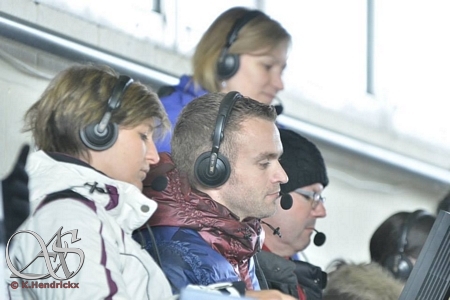 I recall that 4 years ago you did the commentary for Belgian TV and I know you did the opening ceremony this time, but not the rest?
I recall that 4 years ago you did the commentary for Belgian TV and I know you did the opening ceremony this time, but not the rest?
"For Sochi I did the commentary, but from the studio at home. This year the Belgian channels show highlights of the Olympics with just snippets of figure skating, so they don't have specific experts for that. I did indeed commentate the opening ceremony, which I found a bit lackluster, to be honest. I had expected more of a spectacle. I was waiting for Yuna Kim, she is a star and very popular in Korea, but it lasted so long before she came and then it was over in few moments. I did think it was a shame where they placed her. At that that height it must have been so cold and so much wind, they could have found a better spot for her."
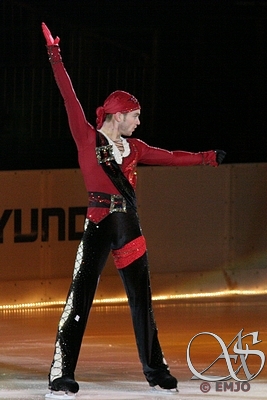 Back to the past. What was your favorite of the 6 programs you skated at your Olympics?
Back to the past. What was your favorite of the 6 programs you skated at your Olympics?
"Pirates of the Caribbean of course. It will always be Pirates. Not because of the choreography, but because I love the music so much. Same with Tango de Roxanne. I just can't get sick of that."
Last but not least, what do you recall the most out of all your Olympic Games?
"What I recall very much from Salt Lake City is the whole judging scandal with the pairs which caused the judging system to change. It really was the hot topic of those games, everybody was talking about that. It was so strange, it was figure skating and we were in the US. Figure skating was the most important part of the Olympic Games there. Michelle Kwan went for Gold and that was really hyped up and all of a sudden the conversation was only about that scandal. Nobody talked about anything else. Was it true, or not? Do you also think they were better or not? Journalists and media wanted to know your opinion etc. etc.
I will also never forget that Linda van Troyen (his then-coach -ed) and I were watching the short track competition, the finale with Apollo Anton Ohno, and they all fell, and the Australian Steven Bradbury who barely qualified won it all. It was funny, in an ironic way. He went with luck to the quarter finals and with luck to the semi finals and the finals and then he won it all, because the rest failed. The atmosphere in that stadium changed so entirely; everybody so ecstatic for the Americans, to complete disillusionment, within 2 seconds. Those two things I will never forget."
